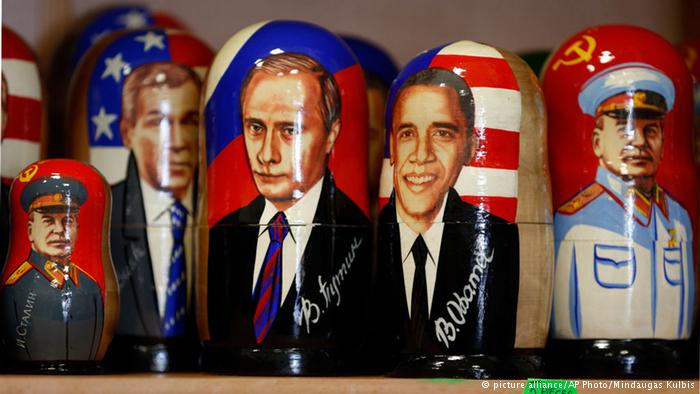
Bob Spies
.
After the Strangelovian comments recently made by former NATO Deputy Supreme Allied Commander Sir Richard Shirreff, it’s refreshing to see a mainstream German news outlet raise the question, "what about diplomacy”? Let’s hope mainstream U.S. media are now bold enough to do the same.
Bob Spies
May 22, 2016
NATO, Russia and the lost art of diplomacy
A former NATO leader says there is a real risk of war with Russia as early as 2017. Arm up or face the consequences is the advice. Whatever happened to diplomacy, asks Fiona Clark.
Picture this: A group of Brits, anxious to escape the EU and the rain, pack up shop and move to the far eastern wilds of Siberia to brave bears and the -47 C winters to start a new life.
According to the UK’s Express newspaper that’s an option 78 percent of UK residents would consider if a bill that’s just passed the lower house of the Russian parliament becomes law. It would grant 300 applicants, for free, 2.5 acres of land somewhere not far from the middle of nowhere. Foreigners wouldn’t have full ownership unless they became Russian citizens, but they would have rights to use the land and develop a business – in agriculture or tourism – as the country which spans 11 time zones attempts to develop the areas it once thought only fit for gulags. It’s a reality show in the making.
Lulled by a video filmed sometime over the very short Siberian Summer that features a flirtatious, bare-footed blonde dressed in a short, traditionally-styled tunic carrying an earthen pot reminiscent of Keats’s "Ode to a Grecian Urn,” the Express says, "The scheme has captured the imagination of the British public, many of whom have been seduced by the area’s stunning natural beauty as well as Mr Putin’s no-nonsense leadership style.” Some 22,000 responded to the poll which asked, "Would you move to Russia in exchange for free land?” The resounding response: "Yes! Bargain.”
Nuclear war ‘highly probable’
It’s true, the area is stunning. It’s where snow-capped volcanos meet the sea. And while it’s devoid of pubs, flat beer, and fish and chips, its remoteness could prove to be its greatest advantage if General Sir Richard Shirreff, a former Nato deputy supreme allied commander in Europe, is right. He believes Russia and NATO are on course for a nuclear war unless the organization, and Britain in particular, grows a spine and arms itself to the back teeth in a bid to ward off an expansionist Russia.
The statements were made as he promoted his fictional book 2017 War with Russia,but Shirreff said the events depicted in it were "highly probable” unless NATO members acted now to avoid "potential catastrophe.”
Stating (not exactly correctly) that Russia had invaded Georgia in 2008, Crimea in 2014 and later Ukraine, Shirreff said it’s not out of the question that Putin, who has said he’ll defend Russians wherever they are, would soon turn his attention to the Baltic nations, and if that were the case the country would be at war with NATO.
NATO has stepped up its defenses in the Baltic states, but Shirreff says it needs to "raise the bar sufficiently high for any aggressor to say it is not worth the risk.” At the moment it’s not high enough, he says. The preface to his book takes aim at the UK government, stating: "A country famous for once ‘walking softly and carrying a big stick’… now has a leadership that shouted loudly but, thanks to ongoing defence cuts, carried an increasingly tiny and impotent stick.”
My stick is bigger than your stick
His words come as NATO prepares to welcome Montenegro into its fold as the 29th country to join the alliance. NATO countries now come right up to Russia’s border and are armed with weapons they tell Russia aren’t intended for use on it, but from a Russian point of view could easily be turned in their direction.
In response, Russia has said it will up its defenses asymmetrically. It’s been buzzing US warships on exercises in the Baltic Sea, staging dangerous fly-by’s on civilian aircraft and generally trying to show it has a big stick too. We’re witnessing an arms race in Europe just 71 years after the end of World War II. But where’s the diplomacy? If we are truly on the verge of a nuclear war, surely every effort should be made to bring Russia into the fold too – after all it’s not that long ago that Russian inclusion in NATO was mooted.
The West may not like Putin and that feeling may well be justified, but a policy of isolating and publically humiliating a leader who is increasingly popular on his home territory may not be the smartest tactic. So far the sanctions and criticism against Russia have been used to fuel anti-Western sentiment and growing nationalism. Western leaders have to understand that Russia is not apartheid South Africa where the vast majority were oppressed by the minority – Russians genuinely like and trust their leader and will rally around to defend the motherland if they perceive they are under threat.
Without a change in tactic, Shirreff’s prediction may well become a self-fulfilling prophecy. And if that is the case, Siberia may not be far enough away for the UK’s would-be emigrants. New Zealand might be a better option.





_jpg/250px-ElbeDay1945_(NARA_ww2-121).jpg)





